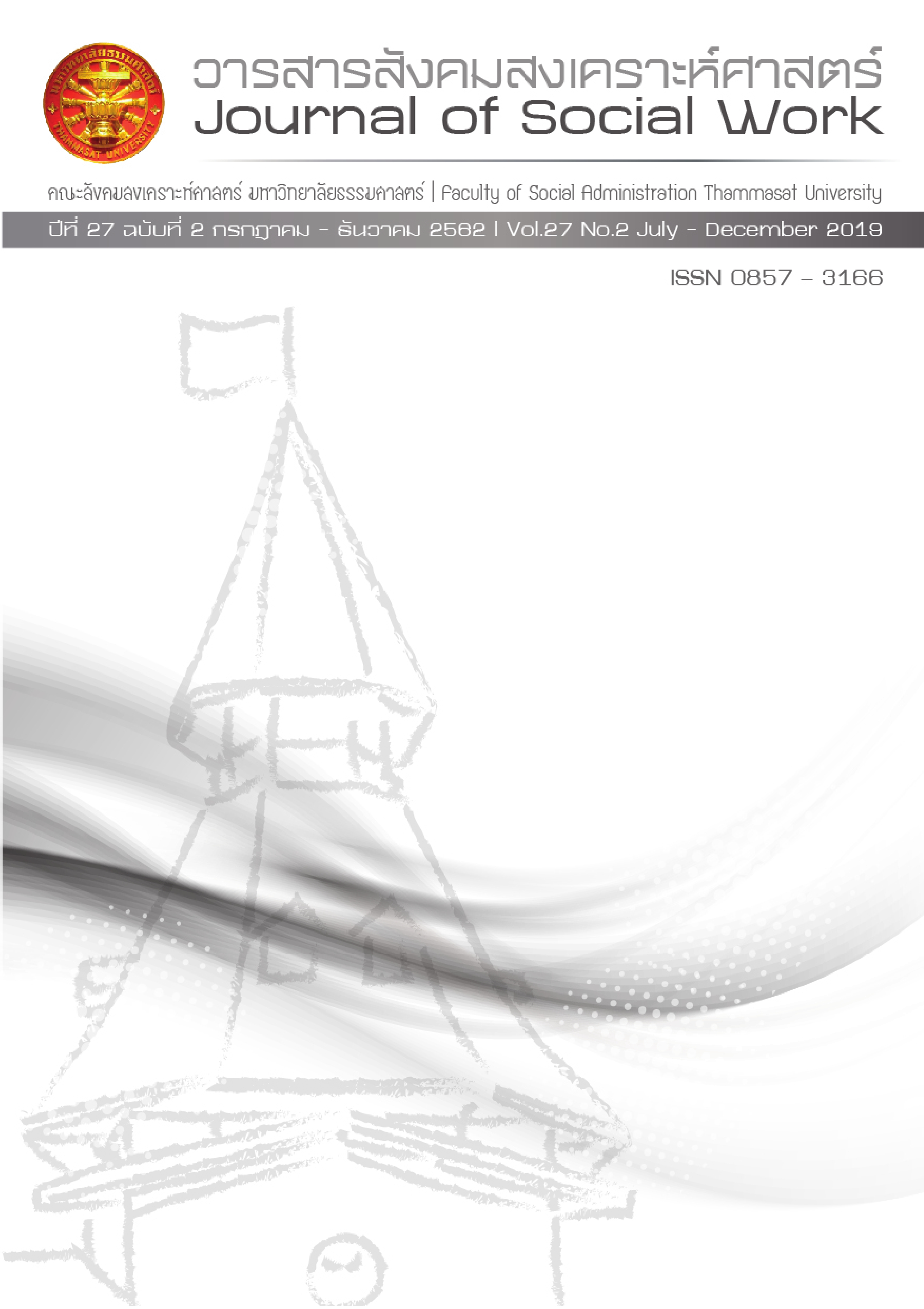The Quality of Life Among the Elderly: Decoding of the Experts and Active Ageing
Keywords:
Quality of Life, Elderly, Qualitative ResearchAbstract
This qualitative study was an attempt to gain understanding and explain the meaning of quality of life (QoL) among the elderly. knowledge for practice and knowledge in practice were decoded and derived from experiences and emic view. The subjects of the study consisted two groups of key informants: five experts (X) and three active ageing (AG). Both of them were selected by means of purposive technique and in-depth interview was employed to collect the data.
Findings reviewed the following: the QoL of the elderly vary according to their context, definition and key influence domain of QoL cannot be separated. It can be explained that the elderly’s life status was perceived by themselves underneath a context and a meaning of social system where they live and relating to individual purpose, social standard and concerned. However, the possibility of quality of life depended on two key factors. First, Internal factor from themselves were included 1) their preparation and long-term planning in advance 2) keeping good physical, mental, social, and spiritual health 3) forming securities and safety. Second, external supporting factors was to enhance social and cultural ecosystem which can be summarized as follows: 1) having interactions with others 2) living in appropriate environment and with supportive facilities and 3) gaining government supports, also there are development program/curriculums.
References
ปิยะวัฒน์ ตรีวิทยา. (2559, พฤษภาคม). กรอบแนวคิดเกี่ยวกับคุณภาพชีวิต: concepts of quality of life. วารสารเทคนิคการแพทย์เชียงใหม่. 49(2): 171-184.
พระพรหมคุณาภรณ์ (ป. อ. ปยุตฺโต). (2555). พุทธธรรม ฉบับปรับขยาย. พิมพ์ครั้งที่ 35. กรุงเทพฯ: ผลิธัมม์.
วิทยาลัยประชากรศาสตร์ จุฬาลงกรณ์มหาวิทยาลัย และมูลนิธิสถาบันวิจัยและพัฒนาผู้สูงอายุไทย.(2555). รายงานประจำปี สถานการณ์ผู้สูงอายุไทย พ.ศ.2554. กรุงเทพฯ: พงษ์พาณิชย์เจริญผล.
ศศิพัฒน์ ยอดเพชร. (2542). แนวคิดด้านสวัสดิการสังคมสู่วัยสูงอายุที่มีคุณภาพ. ใน เอกสารประกอบการประชุมวิชาการแห่งชาติว่าด้วยผู้สูงอายุ “สู่วัยสูงอายุด้วยคุณภาพ” จัดโดย คณะกรรมการดำเนินการจัดกิจกรรมปีสากลว่าด้วยผู้สูงอายุด้านวิชาการ. กรุงเทพฯ: โรงพิมพ์แห่งจุฬาลงกรณ์มหาวิทยาลัย.
ศศิพัฒน์ ยอดเพชร. (2549). สวัสดิการผู้สูงอายุ แนวคิดและวิธีการปฏิบัติงานสังคมสงเคราะห์ (ฉบับปรับปรุงครั้งที่ 2). พิมพ์ครั้งที่ 2. กรุงเทพฯ: มิสเตอร์ก๊อปปี้ (ประเทศไทย).
ศศิพัฒน์ ยอดเพชร, ภาวนา พัฒนศรี และธนิกานต์ ศักดาพร. (2560). รายงานฉบับสมบูรณ์ โครงการการถอดบทเรียนตัวอย่างที่ดีของโรงเรียนและชมรมผู้สูงอายุที่มีกิจกรรมถ่ายทอดความรู้. กรุงเทพฯ: เจพริ้นท์.
ศศิพัฒน์ ยอดเพช, อรพิชญา ไกรฤทธิ์ และอาชัญญา รัตนอุบล. (2559). สรุปการสัมนาวิชาการ เรื่อง แนวโน้มการวิจัยเพื่อการสร้างความรู้ใหม่ ในการป้องกันและแก้ปัญหาผู้สูงอายุในประเทศไทย, 18 สิงหาคม 2559; กรุงเทพฯ.
ศิรินันท์ กิตติสุขสถิต และวนิพพล มหาอาชา. (2550). คุณภาพชีวิต...ความสุข...และ...วัยรุ่นไทย. ในหลากหลายมิติแห่งความอยู่ดีมีสุขของคนไทย. รศรินทร์ เกรย์ และคณะบรรณาธิการ. หน้า 66-68. นครปฐม: สถาบันวิจัยประชากรและสังคม มหาวิทยาลัยมหิดล.
ศรีประภา เหล่าโชคชัยสกุล. (2552). การพัฒนาตัวบ่งชี้ความอยู่ดีมีสุขของนักเรียนมัธยมศึกษาตอนต้น: การวิเคราะห์โมเดลสมการโครงสร้างกลุ่มพหุ. วิทยานิพนธ์ครุศาสตรมหาบัณฑิต (วิจัยการศึกษา). กรุงเทพฯ: บัณฑิตวิทยาลัย จุฬาลงกรณ์มหาวิทยาลัย. (เอกสารอัดสำเนา)
ศูนย์ข้อมูลกลางด้านศาสนา กรมการศาสนา. (2561). สถิติผู้นับถือ. (ออนไลน์). แหล่งที่มา: http://e-service.dra.go.th/buddha.php?p=stat วันที่สืบค้น 30 เมษายน 2562.
สำนักงานคณะกรรมการพัฒนาเศรษฐกิจและสังคมแห่งชาติ. (2551). แผนพัฒนาเศรษฐกิจและสังคมแห่งชาติ ฉบับที่ 3. (ออนไลน์). แหล่งที่มา http://www. nesdb.go.th/Default.aspx?tabid=85 วันที่สืบค้น 15 เมษายน 2560.
สำนักงานคณะกรรมการพัฒนาเศรษฐกิจและสังคมแห่งชาติ. (2554). แผนพัฒนาเศรษฐกิจและสังคมแห่งชาติ ฉบับที่ 11. (ออนไลน์). แหล่งที่มา: http://www.nesdb.go.th/download/article/article_20160323112431.pdf วันที่สืบค้น 15 เมษายน 2560.
สำนักงานคณะกรรมการพัฒนาเศรษฐกิจและสังคมแห่งชาติ. (2559). แผนพัฒนาเศรษฐกิจและสังคมแห่งชาติ ฉบับที่ 12. (ออนไลน์). แหล่งที่มา: https://www. nesdb.go.th/ewt_dl_link.php?nid=6422 วันที่สืบค้น 15 เมษายน 2560.
องอาจ นัยพัฒน์. (2551). วิธีวิทยาการวิจัยเชิงปริมาณและเชิงคุณภาพทางพฤติกรรมศาสตร์และสังคมศาสตร์. พิมพ์ครั้งที่ 3. กรุงเทพฯ: สามลดา.
Charmaz, K. (2006). Constructing grounded theory: A practical guide through qualitative analysis. London; Thousand Oaks: SAGE.
Cochran-Smith, M.; and Lytle, S. L. (2001). Beyond Certainty: Taking an Inquiry Stance on Practice. in Teachers Caught in the Action: Professional Development that matters. pp. 45-58. New York: Teachers College Press.
Knowles, Malcolm S. (1980). The Modern Practice of Adult Education: Pedagogy to Andragogy. New York: Cambridge, The Adult Education.
Maslow, A. H. (1970). Motivation and Personality. New York: Harper and Row.
Oliver, Joseph; et al. (1996). Quality of Life and Mental Health Service. London: Routledge.
The WHO Group. (1999, November). The World Health Organization quality of life assessment (WHOQOL): Position paper from the World Health Organization. Social Science and Medicine. 49(10): 1403-1409.
World Health Organization. (2002). Active Ageing: A Policy Framework. A contribution of the World Health Organization to the Second United Nations World Assembly on Ageing, Madrid, Spain, April 2002.
Published
How to Cite
Issue
Section
License
The manuscripts published in the Social Work Journal is the copyright of the Social Work Journal, Thammasat University
Any article or opinion appeared in the Social Work Journal will solely be under the responsibility of the author The Faculty of Social Administration, Thammasat University and the editors do not need to reach in agreement or hold any responsibility.



